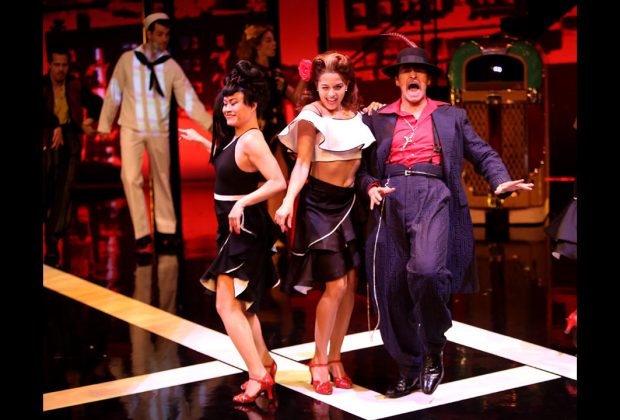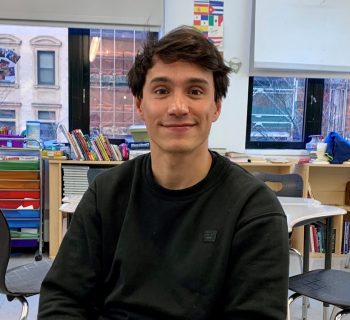Demian Bichir grew up in a theatrical family. Now known for such movies as "A Better Life" and "The Hateful Eight," he returns to the stage in "Zoot Suit" at the Mark Taper Forum...
By Daryl H. Miller L.A. Times ~ February 5, 2017
http://www.latimes.com/entertainment/arts/la-ca-cm-demian-bichir-20170205-story.html
Demian Bichir is quite attached to his hat. “I sleep with it, take showers with it,” the 2012 lead actor Oscar nominee says after finishing the day’s rehearsal for the Mark Taper Forum revival of “Zoot Suit.”
He holds out the sleek, black fedora for closer inspection. It is at once reserved and dandyish, with a brim that sweeps up in back into what look like vintage Cadillac tail fins. Tucked into its matching ebony band is a little explosion of color: a gray-green and red feather. By essentially living in this custom-made beauty, Bichir stays constantly connected to El Pachuco, the impeccably dressed host, narrator and mythic zoot suiter he portrays in Luis Valdez’s play about Mexican American devotees of zoot suit style who were arrested and tried en masse after a 1942 Los Angeles killing.
Such immersion is typical of the 53-year-old Mexico City-raised, bilingual, dual-citizen actor. Chris Weitz, who directed Bichir in his Oscar-nominated role as an undocumented L.A. gardener in “A Better Life,” recalls: “He bought a truck off the street, a pretty broken-down pickup of the kind that you see all around the city being used by gardeners. He wanted to drive around and live like that guy for a while.”

After a rehearsal of the Mark Taper Forum's production of "Zoot Suit," Demian Bichir tries out one of his poses as the show's host, narrator and mythic zoot suiter known as El Pachuco. (Robert Gauthier / Los Angeles Times)
Told of Weitz’s testimonial, Bichir laughs and shrugs it off. But the people who see him in action are impressed. “He wants to get into the skin of the character as much as possible,” Weitz says. “He sees acting as a way to form deep empathy with people and convey what he’s learned to an audience.”
Ridley Scott, Bichir’s director on the forthcoming film “Alien: Covenant,” says by email that the actor is “full of enthusiasm and ideas — always with great questions and solutions.”
Embedded among those qualities is determination, which drove Bichir, a rising young actor in Mexico, to spend years in the States in his 20s to perfect his English and try to land the sorts of American movies headlined by Pacino, De Niro, Nicholson and other actors he admired. The attempt sputtered, but that didn’t stop him from trying again after an Oscar-equivalent Ariel award and other high-profile successes in Mexico.
Since making the leap by portraying a powder-keg Fidel Castro in the two-part 2008 biopic “Che,” he’s shape-shifted through such diverse roles as a Russian gangster in “Dom Hemingway,” an FBI boss in “The Heat” and a furry, piano-playing outlaw in “The Hateful Eight,” as well as the devilishly charming crime-lord and mayor in the Showtime series “Weeds” and the psychologically tortured detective on FX’s “The Bridge.”
Theater saturated the home in which Bichir grew up as the middle son in what has become one of Mexico’s great acting families. His parents are actor-director Alejandro Bichir and TV and film actress Maricruz Nájera, and his brothers are actors Odiseo and Bruno Bichir.
Bichir, who first performed on stage at age 3 and was directed by Tony winner Jose Quintero when the actor was 17, returns to the theater when he can. When he heard about the Taper’s revival of its landmark 1978 production of “Zoot Suit,” he sought an interview with playwright-director Valdez to detail his vision for the role.
An actor who these days works with the likes of Oliver Stone, Quentin Tarantino and Scott wanted to walk the boards again in a role that made a strong impression on him in his teens when he saw Valdez’s film version of the play.
“This is high literature,” says Bichir, folded into a rehearsal room chair. “This is a play that should not take 40 years to be re-staged. Like Tennessee Williams and Arthur Miller and Shakespeare, this is a classic.”
He talks about playwrights with the same enthusiasm that he could about soccer or baseball. In his early teens, he was so mad for soccer that he trained to play professionally. But theater kept whispering in his ear — as did his father, who offered this beautifully concise bit of advice: “I know you love soccer, Demian, but don’t ever forget, the theater loves you more.”
“El Pachuco represents all Mexicans since the beginning of time.”
El Pachuco is invisible to everyone but 21-year-old lead character Henry Reyna, a commanding figure among the youth of his neighborhood and a zoot suit adherent who, with 21 others, is charged with murder and put on trial. Functioning as Reyna’s alter ego, El Pachuco helps the young man withstand aggressive policing, a sensationalistic press and early war hysteria in this play inspired by the 1942 Sleepy Lagoon Murder in Los Angeles and subsequent quash of young zoot suiters.
“The role requires a certain presence of mind and body and spirit that is more akin to leading roles in Shakespeare,” Valdez says in a separate interview. It also comes with a towering legacy: Edward James Olmos’ crackling original performance.
“We were looking for someone distinctive, someone who could take on the legacy that Eddie Olmos created, but at the same time bring something new and unique to the role,” Valdez says. “Demian brings a slightly older Pachuco” — Olmos was 31 when he created the part — “with a different kind of depth. He has this tremendous sense of maturity about him; he’s a gentleman.”
Trim and muscular, the actor has another quality that a stop at the gym on the way home will help to keep honed. “He has tremendous sex appeal,” Valdez says, “and the Pachuco should have that quality. That’s part of his magic.”
Bichir is curious to see how a new generation will react to the play. “The timing,” he adds, “couldn’t be more perfect. This play talks very clearly about discrimination and racism, and it’s a big criticism to fascism and stupidity and ignorance. “And that is precisely where we are living right now: Whenever we see someone different than us — who dresses differently, speaks differently, acts differently — instead of putting ourselves in their shoes we immediately disconnect.”
On screen Bichir will be seen in “Lowriders,” opening May 12, as an L.A. father struggling to connect with two rebellious sons. A week later comes the release of “Alien: Covenant,” in which Bichir plays chief of security on the Covenant spacecraft as it conducts a colonizing mission.
Branching out, he wrote, directed, co-produced and acts in “Un Cuento de Circo & A Love Song,” which has been playing at film festivals. Stefanie Sherk, his girlfriend, is one of the leads.
Theater is the taproot for it all. When Bichir was growing up in Mexico City, his parents were actors with a roving theater company. The boys were taken along.
His mother, speaking from Mexico City, recalls: “He would learn what I would say and at home he’d act out what he saw us do in the theater.”
As his interest in acting grew, she and her husband advised “that he should fall in love with every character that he plays, that he has to have an iron discipline, that he had to fall in love with the profession.”
Of their close-knit family, younger brother Bruno says by email that “all my memories are about talking about theater, acting, films, music, art.”
“We see theater as a temple. But also [it] is our playground.”
Finishing his long day of “Zoot Suit” rehearsal, Bichir concludes: “I guess we got enchanted. We got beautifully contaminated” by “the backstage and the smell of it, the wardrobe and the fake mustaches, this make-believe type of world. It’s magical; it’s just beautiful.”
Cecilia Sanchez in The Times’ Mexico City bureau contributed to this report.
‘Zoot Suit’
Where: Mark Taper Forum, 135 N. Grand Ave., L.A.
When: 8 p.m. Tuesdays-Fridays, 2:30 and 8 p.m. Saturdays, 1 and 6:30 p.m. Sundays. In previews; opens Feb. 12. Ends March 19.
Tickets: $25-$99 (subject to change)
Information: (213) 628-2772 or www.centertheatregroup.org
'Zoot Suit': How Latino theater born in the farm fields changed L.A. theater forever

"Zoot Suit" playwright Luis Valdez in 1978, flanked by Gordon Davidson, left, and César Chavez. (Center Theatre Group)
By Sylvie Drake, L.A. Times ~ February 5, 2017
http://www.latimes.com/entertainment/arts/la-et-cm-zoot-suit-20170205-story.html
It was 1946. The cotton-picking season was over in the San Joaquin Valley, but the truck wouldn’t go, the money was running out and this farmworker family was living on fish tacos. Father fished, mother made tortillas. When 6-year-old Luis fell into the river while fishing with his dad, Mama decided the boy would be safer in school.
So Luis climbed onto the big yellow bus with his fish taco lunch in a paper bag that his mother told him to bring back. One day, he couldn’t find the bag. He panicked.
“My teacher asked what was wrong,” recalled Luis Valdez, author and director of the “Zoot Suit” revival that’s in previews now and officially opens Feb. 12 at the Mark Taper Forum. “I mentioned the bag. She said, ‘Oh, I took it.’” The teacher walked Luis into a room where the bag was wet in a basin. She cut the paper into strips and placed them onto a mold — a monkey mask for the Christmas play.
Luis had been introduced to what he later called “one of the secrets of the universe”: papier-mâché. He was one of two first-graders chosen to wear those masks. It was his big moment. Three days before the play, however, he came home to find the family packing. “We're leaving,” his mother said. “We’re being evicted.” Luis cried. His mother cried. And at dawn, the family climbed into a truck, and Luis watched his school recede into the valley fog.
It was a heartbreak that changed his life. “I took the secret of papier-mâché, the undying desire to do theater — and the residual anger of that eviction from the labor camp,” Valdez said in a recent conversation at the Music Center. “I was in that school 30 days. In and out. Twenty years later I met César Chavez and pitched him the idea of a farmworkers’ theater.”

Luis Valdez, front, with the cast of the 1978 production of "Zoot Suit" at the Mark Taper Forum. (Jay Thompson)
Today, at a vigorous 76, hair and mustache graying, Valdez flashes the same benevolent smile he flashed when his aptly named El Teatro Campesino, the Farmworkers’ Theater, was in its infancy in the 1960s. Valdez and I first met during those salad days, shortly before I joined the drama desk of the Los Angeles Times, as I was completing my MFA on the Inner City Cultural Center, an L.A. company founded in response to the 1965 Watts Riots and the place where Valdez’s troupe of campesinos was invited to perform.
In September 1965, Chavez led a strike in the Central Valley to protest low pay and poor working conditions.
“I went to Delano to see Chavez in the first week of the strike,” Valdez said. “We marched, but I felt intimidated. Chavez had important meetings. I was afraid he’d see my idea as frivolous.”
Later, in San Francisco, he shared his thoughts with civil rights activist Dolores Huerta, co-founder of the farmworkers movement. She arranged a meeting between Valdez and Chavez, who was tired but supportive. “There’s no money for theater in Delano,” Chavez said. “No actors, no stage. Not even time to rehearse. You still want to do it?’”
Valdez’s reply: “Absolutely.”
What was striking about that early work was its combustion of raw energy, defiance, irony and joy. Intended to increase awareness of the Delano strike — la huelga — the plays used comedy to humanize the plight of laborers by spoofing the callous treatment they received at the hands of grape growers. No one had spoken up so fearlessly before — not for the strike, the farmworkers nor the Latino presence in California.
It was new. And it was important. El Teatro took its cue from the San Francisco Mime Troupe, a ramshackle Vietnam-era political protest group that played parks and public places with abandon and glee. Valdez had cut his acting teeth as a member of that troupe. But he really wanted to be a playwright — a bilingual, bicultural American playwright born to bilingual farmworkers in Delano.
I traveled to Delano, saw El Teatro perform in the fields and chatted with Valdez — relaxed, chomping on his cigar, eager to discuss the future. That included moving on to full-length plays. I asked what he’d do for money. Sell a couple of cars, he said. Money didn't matter. Schedules didn’t either. Visiting critics? Ha!
“We were from the grape strike,” Valdez said, laughing these many years later. “We were farmworkers. We hadn’t reached PR!”
But El Teatro Campesino was the real deal.
“That’s what Peter Brook said when he came to work with us in 1973 — ‘Your theater is organic,’” Valdez said, quoting the eminent English director and two-time Tony winner.
Valdez’s first full-length play, “The Shrunken Head of Pancho Villa,” was performed in 1965 and won the attention of William Saroyan. (“Saroyan was from Fresno, man,” Valdez said. “I could identify!”) Ten years later Valdez landed on the radar of L.A.’s most significant theater-maker, Gordon Davidson, artistic director of Center Theatre Group, who commissioned a full-length play.
That play was “Zoot Suit,” named for the swaggering dress favored by Latino men in the 1940s. The work was based on the 1942 Sleepy Lagoon murder and the 1943 so-called Zoot Suit riots, which rose from racial clashes and Latinos being tried, convicted and, in a reversal, released for inadequate evidence. Valdez fictionalized the events, added music and dance, and infused the piece with allegory, including the symbolic character of El Pachuco, representing the Latino ethos.

Original "Zoot Suit" cast members, from left, Edward James Olmos, Mike Gomez and Karen Hensel, and Daniel Valdez. (Jay Thompson)
“Zoot Suit” opened at the Mark Taper Forum in 1978, drawing a massive Latino audience and becoming the first Latino play to go mainstream. The show’s popularity encouraged the transfer of the production to Center Theatre Group’s Aquarius Theater in Hollywood, where it played for almost nine months.
The decision to take “Zoot Suit” to Broadway in 1979 involved risks. Broadway liked to scoff at L.A. theater. When Davidson took Michael Cristofer’s “The Shadow Box” and Mark Medoff’s “Children of a Lesser God” to Broadway, New York sniffed — even though the former won the Pulitzer Prize and the 1977 Tony for best play and the latter won three Tonys including best play in 1980. When I interviewed the Public Theater’s Joseph Papp after “Children” had won its accolades, he offered icily: “Unlike Gordon, I don’t do disease-of-the-month plays.”
The critics dismissed “Zoot Suit” too. The New York Times’ Richard Eder called it “overblown and undernourished.” But it was a piece by the New York Times’ Walter Kerr that rankled this straight-A English student.
“He said I was to be forgiven for my bad English, that English was my second language,” Valdez recalled. “I thought, doesn’t he know this is based on real events? I’m quoting verbatim from letters? If there’s bad grammar, it’s their bad grammar? I deeply resented this imposition of a stereotype.”
One could argue Valdez had been right to reject Broadway. Latino theater had developed over time (and provocation) in California. For New Yorkers, with little such history, the style and wryness of the piece, and the culture that spawned it, were terra incognita.
But “Zoot Suit” did find an audience that did identify — in L.A., in Cuba, in South America and in Mexico City, where it has been staged eight times.
“The real blessing? I crossed that border in the opposite direction as an American playwright, in Spanish, speaking for the American experience,” Valdez said. “In Mexico, they said, ‘Don't expect the response you got in L.A.’ But we got the same response. We packed the house. ‘Zoot Suit’ is American in a continental sense.
“That, to me, is the future.”

Valdez with his "Zoot Suit" cast outside the Mark Taper Forum in 1978. (Center Theater Group)







